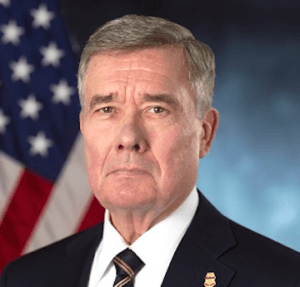US Customs and Border Protection keen on relations with African countries for security

The US Customs and Border Protection, says it is interested in building stronger relations with African countries to ensure security and economic development.
Answering questions from journalists at a teleconference Tuesday November 1, 2016, the Commissioner, R. Gil Kerlikowske, who only recently completed a tour of some African countries including South Africa, Senegal, Morocco, Tanzania and Ghana, said the US agency he heads is working closely with governments in these countries to check and reduce among others, the issues of human trafficking and prevent trafficking in wildlife which he said is a threat to tourism.
He noted that when wildlife is hunted, it hurts the people and the economy, because most countries depend on tourism, and indicated that the goal of the agency is to work with the countries to prevent the negative phenomenon.
He also emphasised the need for cooperation with these countries to improve security.
The crime of trafficking in wildlife is not only posing threats to wild fauna and floral, but it has also become a major source of illicit finance across the world, a forthcoming report by the Global Financial Integrity shows.
According to the report, to be released this November 2016, an estimated $5 to $23 billion is generated every year from the illegal trade in wildlife.
Meanwhile, a 2012 report by the advocacy group, World Wildlife Fund (WWF), which noted that the illegal wildlife trade is a threat to national security, estimated that $19 billion a year is generated from the crime.
On the other hand, the crime of human trafficking generates several hundred billion dollars for traffickers, making the offence a high priority area for governments and civil society organisations.
The recruitment and/or movement of someone within or across borders, through the abuse of power/position with the intention of forced exploitation, commercial or otherwise, generates an amount of $150 billion every year for traffickers, according to the International Labour Organization (ILO).
There are about 21 million people enslaved worldwide, including children under 18 years accounting for 26 per cent of trafficked persons. The victims are forced into early marriage, prostitution and forced labour.
The Africa region has the second highest estimate of about 3.7 million persons enslaved. Asia and the Pacific have the highest number of people in modern slavery in the world – an estimated 11.7 million.
There are 1.5 million persons enslaved in the developed world, according to data provided by Free the Slaves, an organization working to free people in modern slavery around the world.
There are an estimated 103,300 people in modern slavery in Ghana – about 0.33 per cent of the population – with 85 per cent in forced labour and 15 per cent in forced marriage, according to the 2016 Global Slavery Index by the Walk Free Foundation.
The main industries of concern for forced labour in Ghana are farming and fishing, retail sales, manual labour and factory work, according to the Index. It also said an estimated 21,000 children work in fishing along the Volta Lake and its environs.
Information available elsewhere indicates that more than 190,000 people are currently victims of human trafficking in Ghana, and along the Volta Lake alone, more than 49,000 children are engaged in work.
Out of the number 21,000 are forced into hazardous labour that is very dangerous to their lives.
Kerlikowski indicated that the agency has about 800 staff working overseas. These staff are working with governments in Africa to help improve safety and security for businesses.
While in Ghana in October, Kerlikowski signed a Memorandum of Understanding with the Ghana Revenue Authority to train its staff.
He indicated during the teleconference that while cooperation with governments in Africa is important, technology is a game changer in that cooperation. He therefore noted that trust in that relation will improve detection and prevention of crime including smuggling of goods.
Asked how Ghana and the US could work together to secure their borders, taking into account that the two countries are far apart, the Commissioner said the distance doesn’t matter, and the distance is not a defining factor of the relationship, as they work together to improve the quality of life of their people.
By Emmanuel K Dogbevi
Copyright © 2016 by Creative Imaginations Publicity
All rights reserved. This news item or any portion thereof may not be reproduced or used in any manner whatsoever without the express written permission of the publisher except for the use of brief quotations in reviews.
